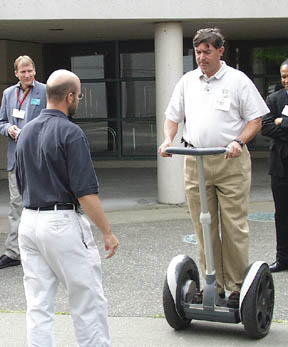Tech executives from around the nation, members of Congress and the governor converged on Tacoma Wednesday to take part in the South Sound Technology Conference 2003.
This years annual forum – the fourth such event – drew a whos who of the technology world to the Tacoma Sheraton Hotel to discuss the growth of technology in the region and provide information about global technology issues.
I think thats critical to our economic future, Congressman Adam Smith (D-9th District) said of creating a high-tech climate in the state that will attract businesses. Smith and Congressman Norm Dicks (D-6th District) were honorary co-chairs of the forum.
The focus of this years event was mobile technology – cell phones, personal digital assistants, hand-held computers and the like – and how it affects our lives.
Its hard to believe in a few short years weve advanced from wire to wireless, observed Gov. Gary Locke during opening remarks.
He continued: Our common goal is to harness technology to build a vibrant future for the South Sound area and Washington state.
Locke pointed to Tacoma – with its downtown renaissance and high-tech reputation – as a case where political leadership and community involvement have come together to produce tremendous success.
He cited the University of Washington Tacomas Institute of Technology, with its focus on spurring new technology enterprises and attracting related businesses to the area, as an example.
The institute is a specific solution to a specific problem, said Locke, adding the institute is continuing to contribute to the areas high-tech economy.
Locke proposed in December 2000 the state develop an institute of technology at the UW Tacoma, and the following year it became a reality.
Earlier this year, the Institute of Technology moved into its new headquarters in the refurbished Pinkerton Building.
Locke also praised the telecommunica-tions network of Americas #1 Wired City, saying services and businesses must be connected instantly to partners and customers.
Advances in technology will improve our lives, Locke concluded.
Keynote speaker Howard Rheingold, author of Smart Mobs: Mobile Communication, Pervasive Computing, and Collective Action, detailed how mobile technology improves peoples lives, while also examining the downside of such technology and making some predictions about the future.
By getting the message out quickly, mobile technology has already had a profound impact on the world. Were seeing the threshold lowered by technology, Rheingold said, as people organize in the physical world in ways not done before.
For example, government hearings in the Philippines were interrupted when thousands of citizens showed up in a public square following text messages calling for protesters, Rheingold said.
Mobile technology is also starting to affect everyday actions in ways that would have seemed like science fiction a short time ago. At an upscale Prada clothing store in New York City, merchandise is equipped with small radio frequency identification tags, Rheingold said.
These tags, he explained, allow the outfits to pop up on a video screen in a dressing room, so that consumers can see a model wearing the garment and check out accessories.
Mobile technology can also have some negative effects, Rheingold conceded, saying the rioters during this years Miss World Pageant in Nigeria were invited by text messaging.
Several people raised concerns about the issue of privacy in the mobile age of technology, as well as security while America is engaged in a global war against terrorism, during a question-and-answer session near the end of Rheingolds address.
Good or bad, mobile technology is a continuation of the ways in which people access information.
Today its taken for granted that anyone can go on the Internet and get information on just about anything and join chat groups on subjects they are interested in, Rheingold said.
What if we were able to do that walking down the street? Rheingold asked, saying the next big thing will be products that focus on location-based applications.
A tourist or visitor to a new city or town would, for example, be able to ask a hand-held device for a map of the area, information on the crime rate, reviews of local restaurants and more, Rheingold said.
Well see those services emerge, Rheingold said, even while noting how difficult it is to predict how technology will affect the future.
Rheingold is confident, however, that technology will continue to spread to more people around the world. Even now, hand-held technology is affordable to much of the world.
Today, 200 million people in China are connected to mobile devices, Rheingold stated. In six or seven years, he estimated, prices for hand-held devices will cost no more than the average monthly salary for the world – $40 to $60 per month – allowing even more access.
Mobile technology and the information it affords to greater numbers of people will become an increasingly important political and consumer issue, Rheingold stated.
Using the past to peer into the future – specifically the invention of the printing press in the 15th century, which helped to create a literate population – Rheingold said mobile technology will have a major impact on society.
It gave me some lenses to see where were going with these mobile technologies, he said.
Other events at the South Sound Technology Conference – attended by up to 300 people – included panel discussions by leaders and workers of various technology companies, a wine and cheese networking event and product demonstrations, the most popular of which seemed to be Segways Human Transporter, the worlds first electric, self-balancing transportation device, which several conference attendees got to take for a spin – mobile technology indeed.







